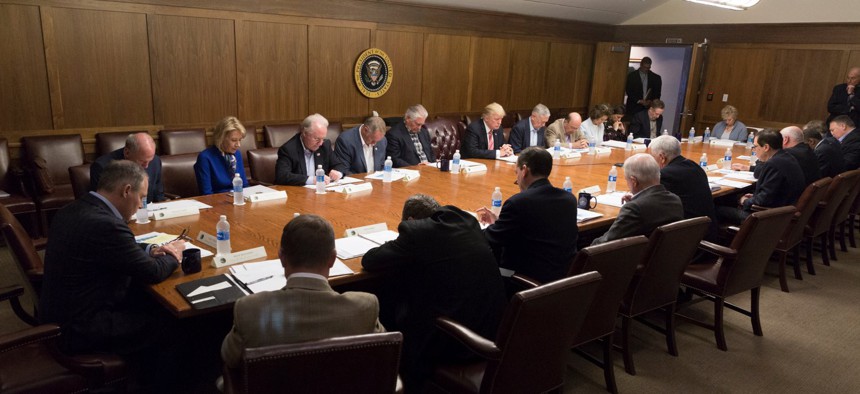
President Trump meets with his Cabinet in September 2017. The White House
Trump Continues to Insist He’ll Never Fill Some Top Government Jobs
“I’m the only one that matters” when it comes to policy decisions, president says.
President Trump took up the issue of the slow pace of political appointments in his administration Thursday, again indicating some of the top slots will never be filled.
In a Fox News interview, Laura Ingraham asked Trump whether the lack of appointees at the State Department was hindering his ability to implement his policy agenda. Here’s how the president responded:
So we don’t need all the people they want. You know, don’t forget, I’m a business person and I tell my people, “Where you don’t need to fill slots, don’t fill ‘em.” But we have some people that I’m not happy with their thinking process. But let me tell you, the one that matters is me. I’m the only one that matters, because when it comes to it, that’s what the policy is going to be. You’ve seen that. You’ve seen it strongly.
We're filling up roles. And don't forget, [Senate Minority Leader Chuck] Schumer and the Democrats are just obstructing. You can't get anything through. We have almost about half the number of people coming through as Obama had. But in addition to that, we don’t need all of the people. You know, it’s called cost saving.
According to a tracker of 609 key politically appointed positions maintained by the Partnership for Public Service and the Washington Post, as of Thursday 261 had no nominee, 5 were named but not yet formally nominated, 170 had been nominated and were awaiting Senate approval, and 173 were confirmed and in place. That is well behind the appointments pace of recent administrations—and the Senate has been slower to confirm appointees as well.
Trump’s approach, if it is indeed based on a strategy of deliberately not making appointments to certain top jobs, could run into complications with the Federal Vacancies Reform Act. That law limits the amount of time acting officials can occupy politically appointed positions. And while the administration has been working on proposals to reorganize federal agencies—and has proposed eliminating 19 of them entirely—the Trump team has not actively pushed to reduce the number of political appointees across government.
In February, Trump declared that many of the jobs he’s supposed to fill simply aren’t necessary.
Now he’s focusing on cost savings as a rationale for leaving them open. Both justifications are, in a roundabout way, a vote of confidence in the career executives and managers who must keep operations running smoothly in the absence of top political leadership. But in the long run, if Trump sticks with his approach of leaving positions open permanently, he will likely find it limits his ability to implement the policies he’s taking sole responsibility for developing.







